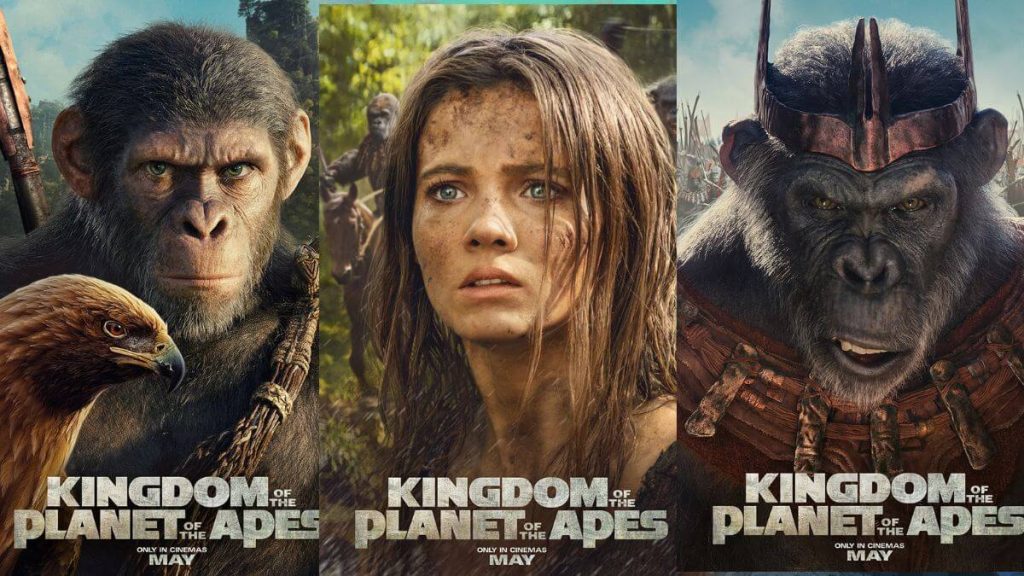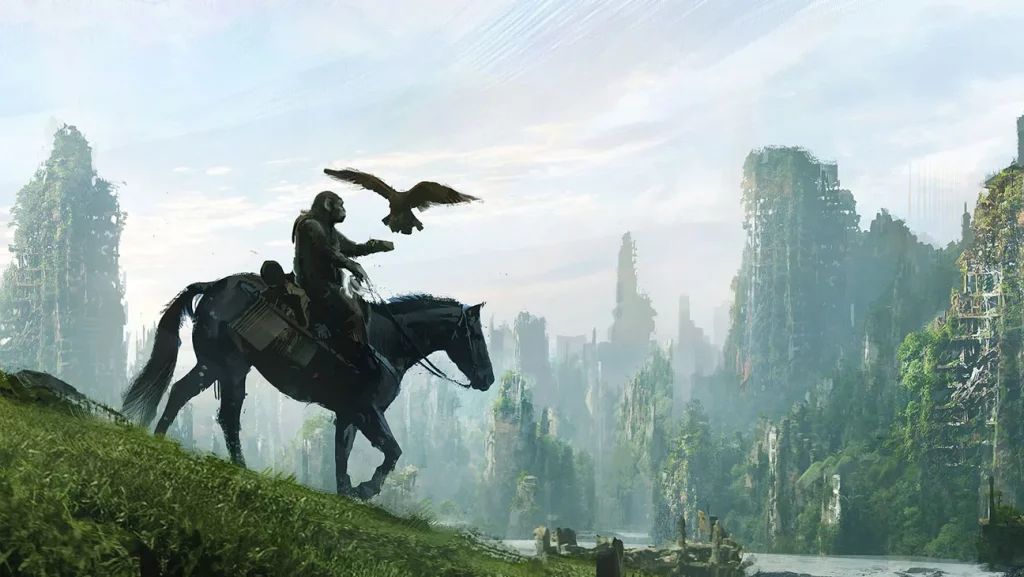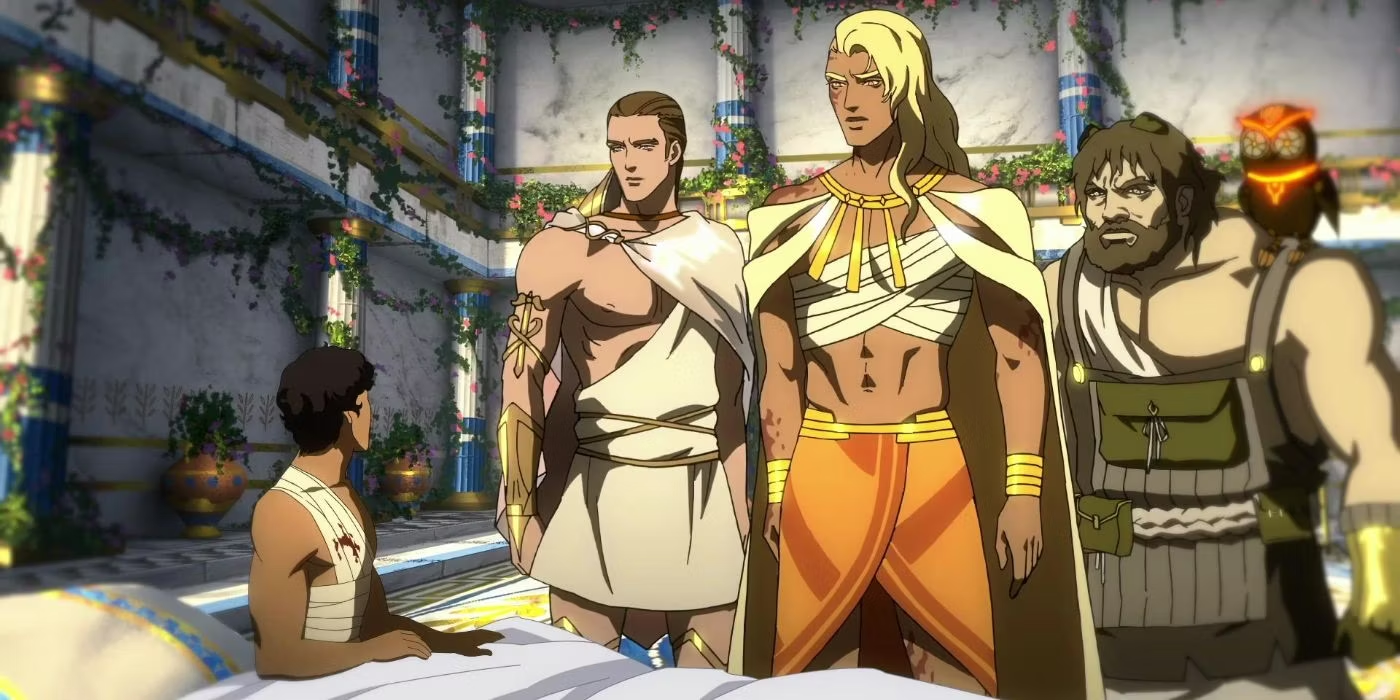Movie Review : Kingdom of the Planet of the Apes
In a forest of teetering, overburdened movie franchises, Planet of the Apes stands as a mighty oak. Where other sprawling sagas spread themselves thin, wear out their welcome, or recycle the same characters and ideas again and again, the Apes series slowly but consistently grows in new directions and reaches new heights. Since its 2011 reboot, Planet of the Apes has been an anomaly amidst big-budget studio tentpoles, emphasising drama over action and utilising digital performance capture technology in the service of great acting and complicated characters. Now, after a seven-year hiatus, a new cast and creative team kicks off a new trilogy with one of the strongest films in the series. Wes Ball’s Kingdom of the Planet of the Apes doesn’t surpass the Shakespearean heights of Matt Reeves’ Dawn, but it does honour its patience and moral complexity, offering an intriguing social thought experiment and exciting ape adventure.
 Kingdom is set centuries in the future, long after humanity has fallen to a plague of its own making that left survivors mute and intellectually stunted. In its place has risen a civilisation of chimpanzees, gorillas, bonobos, and orangutans granted human-like intelligence by the same disease. Our world is a distant memory, and Caesar, the 21st-century ape messiah, has become just that: a legendary figure whose history and message have been obscured and distorted over time.
Kingdom is set centuries in the future, long after humanity has fallen to a plague of its own making that left survivors mute and intellectually stunted. In its place has risen a civilisation of chimpanzees, gorillas, bonobos, and orangutans granted human-like intelligence by the same disease. Our world is a distant memory, and Caesar, the 21st-century ape messiah, has become just that: a legendary figure whose history and message have been obscured and distorted over time.
Our new protagonist is Noa (Owen Teague), a young chimpanzee from a clan that’s never even heard of Caesar. When his village is ransacked by a merciless empire led by Proximus (Kevin Durand), who claims to be Caesar’s heir, Noa embarks on a quest across a forbidden valley to rescue his family. Along the way, he encounters a gentle orangutan philosopher (Peter Macon) and a young human woman (Freya Allan) who may be more than she appears. Their journey is an old-school adventure story, pitting them against natural, man-made, and ape-made obstacles that test their courage, their allegiances, and their ethical boundaries.
Though he demonstrates his bravery early on via a dangerous climb up an ivy-covered skyscraper, Noa is something of an every-ape, sort of a Luke Skywalker to Caesar’s Anakin. (Narratively speaking. They do not share any blood.) Noa’s bland side is a drag in the first act, but the film livens up significantly with the arrival of Peter Macon’s Raka, an instantly likeable scholar who preaches a more peaceful (but still inaccurate) interpretation of Caesar’s gospel. All of the ape characters have unusual rhythms to their speech, but Raka’s radiates pure music. Raka can get a laugh out of a shrug or a glance, but it’s his warm presence that gives the movie life when it needs it the most.
There to challenge Raka’s pacifism and moral certainty is the villainous Proximus, who has flattened Caesar’s philosophy to a single sound byte (“Apes! Together! Strong!”) and repurposed it as a slogan for conquest. Kingdom’s allegory about diverging belief systems from a common source is refreshing in its complexity. Finding or proving what Caesar truly believed isn’t possible, as there are few reliable records of his life. Instead, characters must choose for themselves what they want to do with what little they know.
 The back half of Kingdom involves multiple interlocking moral dilemmas that make the most out of the world left over from the previous trilogy. Apes have inherited the world from a humanity that doomed itself. But does that necessarily mean that everything that was once humanity’s now belongs to ape-kind? What are the apes’ obligations to the former rulers of this world? What is humanity’s role now, and what if they don’t like it? Like the best films in the franchise, Kingdom’s conflict does not map directly to any current events but inspires thought about conflict in general. It’s clear who the bad guy is, but that doesn’t mean all the good guys share the same interests or work towards the same outcome.
The back half of Kingdom involves multiple interlocking moral dilemmas that make the most out of the world left over from the previous trilogy. Apes have inherited the world from a humanity that doomed itself. But does that necessarily mean that everything that was once humanity’s now belongs to ape-kind? What are the apes’ obligations to the former rulers of this world? What is humanity’s role now, and what if they don’t like it? Like the best films in the franchise, Kingdom’s conflict does not map directly to any current events but inspires thought about conflict in general. It’s clear who the bad guy is, but that doesn’t mean all the good guys share the same interests or work towards the same outcome.
As for the visual effects, despite nearly every shot including a digitally-rendered character, the hard work of the VFX team is practically invisible, which is the aim of any effects artist. Wes Ball made a point of shooting as much as possible on location rather than using digital environments, upon which modern blockbusters have developed a troubling reliance. With the effects teams able to dedicate their time and budget to where it’s really needed and the actors able to immerse themselves in an environment, the CGI apes become totally convincing characters.
Kingdom provides a rock-solid foundation for a new series of Apes films, leaving the titular planet with its most interesting status quo to date. Though not the best installment of Planet of the Apes (that remains Dawn), it’s a strong second place, and a fair sight better than the film that launched the last trilogy, Rupert Wyatt’s Rise of the Planet of the Apes. If Wes Ball, screenwriter Josh Friedman, or whoever succeeds them can build on this first chapter as well as Matt Reeves did in 2014, then there’s potential for their follow-up to be every bit as compelling. What a strange feeling it is, amidst the franchise fatigue of 2024, to be excited about the future of a 56-year-old film series and to feel as if its best days might still be ahead of it. Long live the king.
8/10
Boluwatife Adesina is a media writer and the helmer of the Downtown Review page. He’s probably in a cinema near you.






